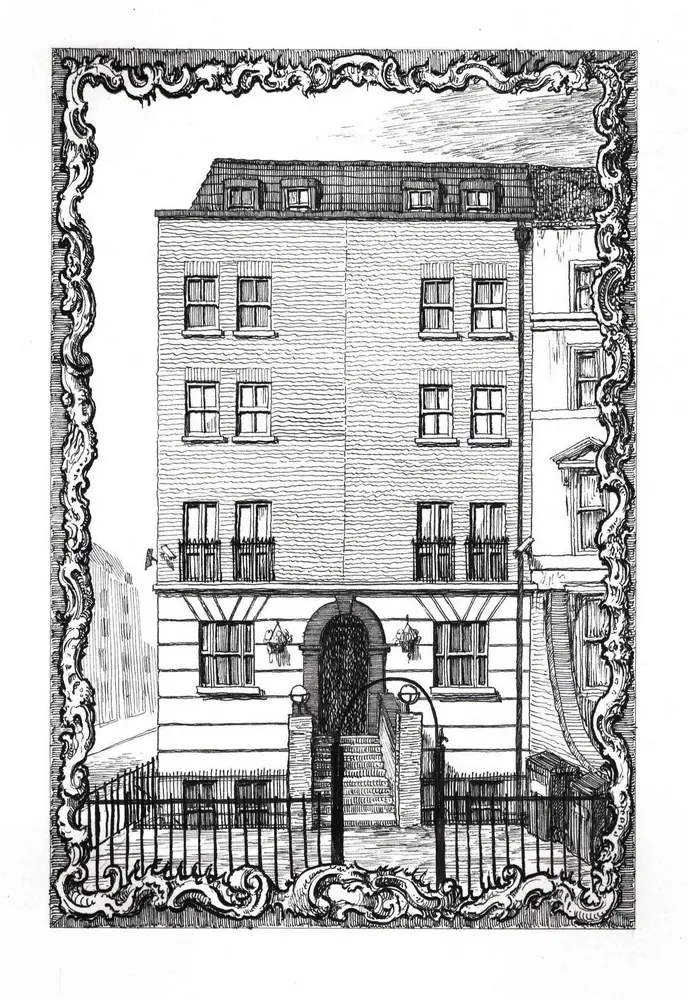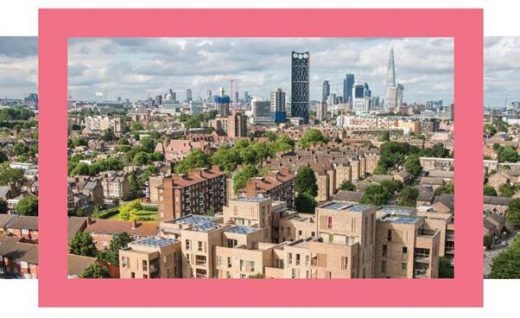RIBA Events, Architecture Debate London, Exhibition, UK Building Talk, British Architects News
RIBA News London: UK Architecture
Royal Institute of British Architects Exhibition + Talks + Events for 2017 & Recent Archive
RIBA London News
Architects confidence in their future work prospects falls as 2017 ends
The RIBA Future Trends Staffing Index has also dropped, entering negative territory for the first time this year.
20 December 2017 – The Royal Institute of British Architects’ (RIBA) Future Trends Workload Index underwent a dramatic fall this month, dropping from +17 in October 2017 down to a distinctly chilly -1 in November.
In terms of geographical analysis, the picture remains mixed. Practices in the North of England (balance figure +7) and the Midlands and East Anglia (balance figure +18) remain the most optimistic about medium term workload prospects., but returned significantly lower balance figures in November than in October. Practices in London continue to be more pessimistic about future workloads, with the balance figure for London falling further into negative territory at -15, the lowest figure for London practices in 2017.
Analysing the November 2017 data in terms of practice size, large practices (51+ staff) returned a balance figure of zero in November. Medium-sized practices (11 – 50 staff) returned a balance figure of -5. Small practices (1 – 10 staff), with a balance figure of -1, were also more cautious this month.
In terms of different work sectors, all our sector forecasts were on a downward trajectory this month. The private housing sector workload forecast remains the most positive of our sector forecasts but was significantly down in November 2017, standing at just +4.
The commercial sector workload forecast had a balance figure of-3 in November 2017, down from +5 in October.
The community sector workload forecast (balance figure -7) and the public-sector workload forecast (balance figure -10) both fell further into negative territory in November.
The RIBA Future Trends Staffing Index was also down this month, standing at -4 in November 2017 compared with +9 in October, entering negative territory for the first time this year.
Small practices (1 – 10 staff), with a balance figure of -5, and medium-sized practices (11 – 50 staff), with a balance figure of -9, were less confident about future staffing levels than large practices (51+ staff), who returned a balance figure of zero.
Commentary received from our participating practices continues to be somewhat mixed. Some practices report steady workloads but others are seeing a reduction in new enquiries. Overall sentiment this month does seem to be a little to the downside in general.
RIBA Executive Director Members, Adrian Dobson, said: “Our November data shows a bit of a winter chill as sentiment is driven down by a lack of clarity over the long-term macro-economic outlook and as pressures on fee levels appear to be tightening. Many of our larger practices have cited uncertainty over the outcome of the Brexit negotiations leading to caution on the part of clients.
“However, we shouldn’t read too much into a single month’s data and these returns pre-date the decision that the Brexit talks can move to phase 2. My biggest concern is the drop in the private housing forecast. RIBA will need to keep a close eye on that in the New Year.”
3 Oct 2017
A Hall for Hull Installation, Humberside, East England, UK
Design: architects Pezo von Ellrichshausen with artist Felice Varini
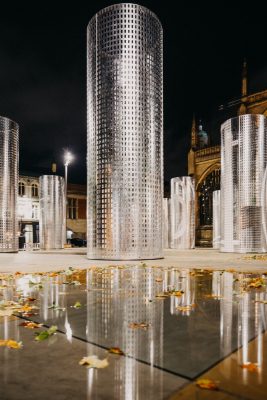
photograph : Thomas Arran
A Hall for Hull Installation
27 Sep 2017
RIBA Learning Centre Competition Winner
Hayhurst & Co has won RIBA’s competition to design a new educational facility at 66 Portland Place.
21 Sep 2017
New Pablo Bronstein Show Unveiled At RIBA
Architecture Gallery, RIBA, 66 Portland Place, W1
21 September 2017 – 11 February 2018
FREE ADMISSION
428 Hackney Road, corner of Temple Street, E2 7AP:
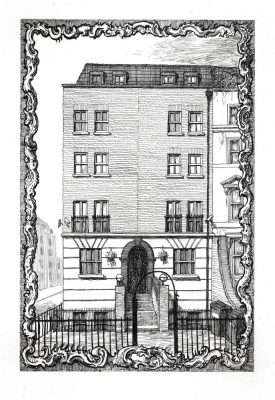
photo © Pablo Bronstein. Courtesy Herald St, London and Galeria Franco Noero, Turin
The RIBA is delighted to present Pablo Bronstein: Conservatism, or The Long Reign of Pseudo Georgian Architecture, which opens today (21 September 2017) – the third in a series of special commissioned exhibitions with artists.
Pablo Bronstein Exhibition at RIBA London
7 Sep 2017
Architects’ confidence recovers some lost ground in July 2017 Future Trends survey
The RIBA Future Trends workload index bounced back a little in July 2017, following a dip in June; the balance figure stands at +14 (up from +10 in the previous month).
Practices outside of London were by far the most optimistic, with the Midlands and East Anglia returning a balance figure of +32.
Practices of all sizes remained positive but large practices (51+ staff) showed the most confidence at increasing future workloads, with a balance figure of +63.
Growth in the value of work in progress, measured on a year-on-year basis, remains at an annualised rate of 1%.
Workload forecasts for all four sectors improved in July, with private housing continuing to lead the way (balance figure +17). The biggest net increase was in the public sector forecast (edging back into positive territory at +3).
The Future Trends staffing index also increased, standing at +10 in July. Large practices were once again the most optimistic about increasing staff levels in the medium-term.
RIBA Executive Director Members Adrian Dobson said:
“Commentary from participating practices points to a steady outlook in the medium term but with more uncertainty over the long-term. Some of last month’s pessimism seems to have lifted but signals remain mixed.
“Some practices have detected nervousness on the part of developers of larger residential schemes. At the same time we have had the first reports for some time of practices struggling to recruit staff with the skills they need.”
4 Sep 2017
RIBA North Cerámica Exhibition
The Royal Institute of British Architects have been working with 13 internationally renowned ceramicists. The Exhibition, Cerámica will be the result of this collaborative process and will also showcase the work that ECAlab directors Rosa Urbano Gutierrez and Amanda Wanner have been generating over the last 5 years.
There will be a number of events which support this exhibition. The Moulding Futures Symposium will be held in December and will bring together leading Architects, Ceramicists, Engineers and Academics to discuss ceramic futures, collaborating artists will present their work at free public presentations, there will be children’s hands-on clay workshops and programmed guided tours of the exhibition from Rosa Urbano Gutierrez and Amanda Wanner.
Cerámica
28 October 2017 – 10 February 2018
Image of the prototype ceiling courtesy of ECALab:
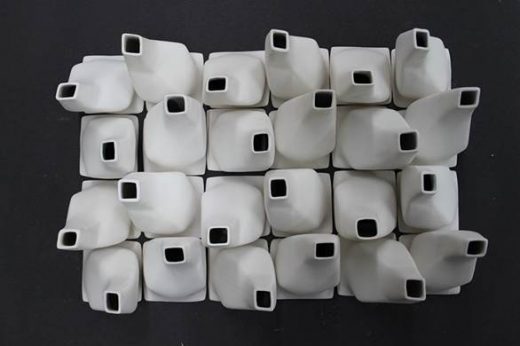
On Saturday 28 October RIBA North, the RIBA’s new national architecture centre on the Liverpool Waterfront, opens its second exhibition, Cerámica, showcasing the future use of ceramics and technology in architecture.
Cerámica will show how traditional ceramic techniques and digital engineering processes can be used together to produce more meaningful and sustainable architectural elements. Using new technologies, British and international ceramicists have created a series of ceramic ceilings and walls that show different vernacular languages, reflecting local heritage and identity. Highlights of the exhibition include full-scale prototypes of light-diffusing facades and ceilings.
Director of RIBA North, Suzy Jones, said:
“This exhibition looks at the future of architectural elements and combines the best aspects of global connectivity and digital capabilities with local craftsmanship. Ceilings, facades and walls may seem rather banal, but this exhibition showcases how we could inject beautiful, hand crafted products into our buildings and spaces.”
The exhibition is supported by the Tile of Spain-ICEX (Spanish Association of Ceramic Tile Manufacturers – Spanish Institute for Foreign Trade) along with Liverpool University and Leeds Beckett University, it is intended that the outcomes from this exhibition will inform the development of viable architectural products.
The exhibition features full-scale prototypes of light-diffusing facades and ceilings, accompanied by a film explaining the experimental design methodologies explored at the ECAlab (Environmental Ceramics for Architecture Laboratory). The exhibition will be supported by the Moulding Futures Symposium in December, to discuss prospective scenarios and futures for ceramics within architecture.
Professor Stuart Walker, world leading professor of design for sustainability says: “Design for sustainability demands a new outlook, a new way of seeing ourselves in relation to the world. It requires not only a rediscovery of local knowledge, practices, materials and forms but also a sharing of best practices and innovative possibilities through the opportunities offered by modern digital and communication technologies. Such technologies enable hitherto unachievable possibilities for local-scale making, efficient use of materials, and sophisticated local solutions. We are at the beginning of a new era, one limited only by the human imagination. The Cerámica exhibition offers an inspiring vision of this potential future.”
30 Aug 2017
RIBA announces autumn 2017 events programme
Events:
10 October, 7pm – 8.30pm
Lie back and think of (Georgian) England
Join us as a variety of thinkers, writers and voices in architecture reflect on the relationship between the triumphant Georgian period and contemporary culture, addressing shifting notions about nationhood, identity and nostalgia in today’s cultural and political climate.
17 October, 6.30-7.30pm
30 January, 6.30-7.30pm
Curator tours
Take an in-depth look into the exhibition with Curator, Shumi Bose, and hear more about the fifty intriguing new drawings of contemporary buildings by Pablo Bronstein which are displayed alongside rarely-seen historical material from the RIBA Drawings Collection. Learn more about the exhibition design by architecture practice APPARATA and the new installation they have created for the RIBA’s Foyer space.
7 November, 6pm – 10.00pm
RIBA LATE: Reaching peak Pastiche
To celebrate the exhibition in the Architecture Gallery, Pablo Bronstein. Conservatism, or The Long Reign of Pseudo-Georgian Architecture, we invite you to an evening of talks, workshops, live drawing, film and music. The evening will explore questions raised around classicist architecture, pastiche and neo-Georgian style raised in Pablo Bronstein’s show and also the George Saumarez Smith (ADAM Architecture) show in The Practice Space, also at RIBA, 66 Portland Place, W1.
16 January 2018, 7pm to 8.30pm
Building Britain’s Ideal
For this discussion, architects, developers, planners and heritage consultants will consider the enduring value of building in historic styles: is the pseudo-Georgian style an homage, a pastiche, or a real crowd-pleaser? A candid discussion around architectural authenticity, artifice, value and meaning within the context of contemporary building.
Booking information:
All tickets are £9.50 Standard / £6.50 RIBA Members, Students and Friends unless otherwise stated.
Book online at www.architecture.com/pablo
Events for Children, Young People & Families:
Design Quest: For ages 5-7
Ornamental Observation
26 October 2017
Be an Architecture Explorer on a hunt for cornices, columns and other classical clues.
A Desirable Residence
27 October 2017
Design and create your own Georgian-style residence…in a box!
Design Quest: For ages 8-10
Street Sets
26 October 2017
Bring London’s streets to life…in miniature! Create a theatre set with stories, characters and amazing architecture.
Classical Creations
27 October 2017
Design a contemporary column inspired by classical styles and produce pattern books to inspire future architects.
Design Day: For ages 11-15
Ornament and Form
7 October 2017
Explore form, colour and texture through mould making and plaster casting.
Drawing Digital
23 October 2017
Transform 18th-century drawings and contemporary photographs into expressive, digitally layered renderings that depict architecture in new ways.
Comic Book London
24 October 2017
Use your own signature style to bring Pablo Bronstein’s drawings to life in a London-inspired comic book.
Mission: Commission
25 October 2017
Your mission: design and model a new architectural exhibition for RIBA.
Skill Up: For ages 15-18
Framing Your View
23 October 2017
Practice drawing techniques to critique or pay homage to different architectural styles.
Designing from Fragments
24 October 2017
Combine drawn fragments from real-life, books and your imagination to develop new architectural ideas.
The Good Old Days
25 October 2017
Explore the effects of heritage and nostalgia in everyday life, the arts and architecture.
Architecture Drawing Day
28 October
11-4pm
Join us for our annual celebration of architectural drawing with workshops and activities exploring different techniques, styles and practices. Whether you are a skilled draughtsman or a complete novice, there’s something for everyone.
Booking Information:
All workshops run 11am-4pm. Tickets cost £40/£25 (eligible for free school meals).
Online booking essential at www.architecture.com
Events for Adults:
Silver Sunday at RIBA
1 October
11am-12.30pm
Free
We’re taking part in a day of free activities for older people across the UK. Take a tour, test out some new creative technology and socialise over tea and biscuits.
Drawing Workshop: Georgian Marylebone, Old and New
14-15 October
10am-4pm
£120/£90 member, student, friend
Walk. Look. Draw! Seek out Georgian styles and influences in a two-day architectural tour of Marylebone with pencils, pads and iPads.
Photography Workshop: Walking Pseudo Georgian London
21 October
11am-4pm
£40/£30 member, student, friend
Anthony Palmer leads a photo-walk exploring ubiquitous Georgian styles on the streets of London.
Architecture Drawing Day
28 October
11am-4pm
Free
It’s a day all about drawing, with workshops and challenges exploring different techniques, styles and practices.
Drawing Domesticity with Starkers
28 October
5pm-7pm
£14/£11 RIBA Members and Friends
As part of Architecture Drawing Day, we invite you to a Starkers Life Drawing Event exploring Georgian domestic traditions that persist today.
Creative Writing Workshop: Building Stories
4-5 November
10.30am-5pm
£185/£167 ages 60+/£157 member, student, friend
Develop your poetry and prose, and learn how sensory responses to our built environment can inform narrative, character development, and plot in your writing.
In collaboration with Birkbeck (University of London) and the British Library.
Drawing Workshop: Architectural Aspirations
25 November
11am-4pm
£40/£30 member, student, friend
Participate in an on-site drawing session and be further inspired by our collection of historic pattern books as we explore how elaborate drawings and detail may speak of architectural value and aspiration, past and present.
Building Tours
Secrets of 66 Portland Place
Select Saturdays, 2:30-3:30 pm
£8, Booking essential
Take a guided tour of our Grade II* listed headquarters. Tour concludes with a special introduction to the exhibition. Enjoy complimentary tea and cake at our café with your ticket.
Booking Information:
[email protected]
Tel: +44 (0)20 7307 3703
www.architecture.com
Pablo Bronstein (born 1977, Buenos Aires) is an Argentine artist based in London. He attended Central Saint Martin’s College of Art and Design, at the University of the Arts London, the Slade School of Fine Art, UCL, and graduated from Goldsmiths College of Art. He specialises in architectural sketches depicting both imagined and existing building, made in ink and watercolour and incorporating styles from the Baroque to Postmodernism. His work also includes live performance: the Tate Britain commission in 2016, ‘Historic Dances in an Antique Setting’ involved choreographed movement within the imposing space of the Duveen galleries.
Apparata are a London based Architectural design practice established by Astrid Smitham and Nicholas Lobo Brennan. Their practice is founded on 14 years of combined experience with established international architectural firms, delivering complex built projects worldwide. They have taught and lectured in institutions including the Gerrit Rietveld Academy, the ETH Zurich, the Berlage Institute TU Delft, TU Munich, EPF Lausanne, and currently teach a studio on housing and civic space at the Royal College of Art, London. In 2017 they were named by the Guardian as one of the top 20 talents to watch. http://apparata.ch/
25 Jun 2017
RIBA Statement on Design for Fire Safety
The RIBA called for a public inquiry in the immediate aftermath of this tragedy and will be calling on our members to provide technical and expert evidence to it. We wish to stress that this should be a full public inquiry, with evidence taken under oath and the inquiry able to order witnesses to attend by summons.
The public inquiry is likely to take some significant time. It would be irresponsible for the RIBA to speculate at this stage about the cause and spread of the Grenfell Tower fire and the reasons for the shocking and distressing level of loss of life.
However, the RIBA believes that certain actions should be commenced in parallel with the public inquiry process. In particular we urge the Government to:
Commence immediately the delayed formal review of Approved Document B, which was first proposed by the Secretary of State for Communities and Local Government in 2013 in response to the Coroner’s rule 43 letter following the inquest into the deaths resulting from the 2009 fire at Lakanal House.
Re-visit the recent review of Building Bulletin (BB) 100, and in particular to consider the mandating of sprinkler systems in all new schools, in parallel with the overall review of Approved Document B.
RIBA Statement on Design for Fire Safety
31 May 2017
Architects confidence in future work prospects remains stable – buoyed by house extensions says RIBA
The Royal Institute of British Architects’ (RIBA) monthly Future Trends workload index, a tool used by the Institute to measure member’s confidence in the economy, was static in April 2017, remaining at +22.
Architecture practices in the North of England (balance figure +48) were the most optimistic about medium term workload prospects this month. Practices in London (balance figure +17) remained more cautious about future workloads, but our practices in the South of England saw a significant uplift in optimism (balance figure +29) compared with the figures we have seen for this region in recent preceding months. Medium-sized practices (11–50 staff) were more optimistic about future workloads, with a balance figure of +36, than either small or large practices (both standing at +20).
Both the private housing sector workload forecast (balance figure +20) and the commercial sector workload forecast (balance figure +9) were unchanged this month. These remain the most strongly performing of our sector forecasts. The public sector workload forecast lost its recent upward momentum, falling back into negative territory, with a balance figure of -5. The community sector forecast, however, continued to rise, standing at +6 in April 2017 – its highest figure since March 2015.
The RIBA Future Trends Staffing Index dipped a little this month, falling to +9 in April 2017 from +12 in March.
This month it was large practices (51+ staff) with a balance figure of +20 that felt most positive about their ability to increase staffing levels. Medium-sized practices (11 – 50 staff), with a balance figure of +15, were also positive about future staffing levels. Small practices (1 – 10 staff) were a little less confident, with a balance figure of +8 in April 2017.
RIBA Executive Director Members, Adrian Dobson, said:
“Commentary received this month from our participating practices continues to suggest a broadly stable market for architectural services. A number of correspondents have commented that the market for private house extensions remains particularly buoyant, but that much of this work is financed via re-mortgaging and is therefore highly sensitive to any correction in house prices.
“At the larger project scale, it seems that infrastructure is likely to continue to be prioritised in terms of public sector capital investment, and sectors such as transport and energy infrastructure are seen as increasingly important by a number of larger practices.
“There continues to be growing interest in the PRS housing sector as financial institutions begin to become more actively engaged, building upon experience in student housing provision.”
25 May 2017
RIBA urges next Government to Build a Global Britain
The next Government must build new communities across the country and keep secure the UK’s position as the global leader in architecture and design innovation says the Royal Institute of British Architects (RIBA) in its General Election manifesto published today (Thursday 25 May).
RIBA’s ‘Building a Global Britain’ manifesto says the UK must:
• Grow as a global trading nation –ensuring the existing mutual professional recognition agreement with the EU is maintained as part of the Brexit negotiations and that new mutual recognition agreements are developed with other key trading nations including the United States, Canada, Australia and New Zealand.
• Put local people at the heart of the planning system – delivering powers on housing and planning to regional and Metro Mayors so cities and regions can deliver more.
• Deliver many more good quality homes that meet the needs of society – perusing development of new high-quality, affordable homes that alleviate the housing crisis and unstick some of the UK’s productivity problems.
• Build schools that are better spaces for learning –ensuring better design of public buildings like schools, museums and hospitals to inspire communities and make the best use of scarce public money.
• Show greater leadership in resilient infrastructure – Supporting innovation in flood defences to catalyse the UK’s export potential in new technologies.
RIBA President Jane Duncan said: “People across the country will be keen to see how political parties respond to the challenges and opportunities of these changing times. Our political leaders recognise the need to improve quality of life across the country; they can start by supporting a better built environment. The RIBA’s manifesto outlines how the next UK Government can ensure that our communities have great high quality, sustainable places in which to live, work and play.
“The UK has a thriving architecture sector delivering inspiring buildings and places across our great nation and around the world. Our multibillion pound contribution to the UK economy and to the country’s reputation abroad is highly prized, and our universities train and equip the architects of the future.
“Whomever forms the next UK Government must recognise the strength and importance of our global cultural links and influence, and continue to support us by safeguarding our ability to attract the brightest and best talent from around the world, as well as ensuring post Brexit that architects practising in the UK are in an environment where they can thrive.”
18 May 2017
RIBA responds to Conservatives Manifesto
The Royal Institute of British Architects (RIBA) has responded to the publication of the Conservatives manifesto, published earlier today. RIBA President Jane Duncan said:
“The RIBA welcomes the Conservatives’ acknowledgment that the UK’s architects are the finest in the world. This is recognition of the vital role that good design has on improving quality of life, sustainability and social integration; and acknowledgement that architects are the design professionals that make this happen.”
“The Conservative Party’s manifesto outlines its vision to further empower communities. Whoever forms the next government should ensure that plans to build high quality housing and infrastructure are linked with industrial and devolution strategies to encourage more jobs and a better quality of life for people across the country.”
On Brexit:
“The RIBA has long been calling for the rights of non-UK EU nationals to be confirmed. I’m happy to see it is included in the Conservative manifesto. Skilled architects come to the UK from across the world, giving us the edge in creativity and innovation; we need to ensure this continues into the future.
“British architects have been clear about our key asks from Brexit through RIBA’s ‘Global By Design’ report. The RIBA will continue to be a strong voice for the sector in the coming weeks and months.”
On planning and communities:
“We welcome the Conservatives commitment to continued devolution. Devolution deals should provide newly-elected mayors and combined authorities with the necessary powers over housing and planning to ensure they can build the sustainable homes and communities that are needed for the future.”
On housing:
“We welcome that the Conservative manifesto recognises the value of UK architects and the built environment in supporting a better quality of life for people across the country, including through quality of space and design. Our evidence has proven that space standards are vital to ensuring that homes are built to the criteria that people need to live and thrive.”
On schools:
“The Conservative party has referenced the value of design throughout its manifesto; this value should also apply to any new investment in the school estate. The RIBA’s ‘Better Spaces for Learning’ report proves that good design in school buildings ensures that public investment is not wasted, and supports the best outcomes for pupils and teachers.”
Infrastructure
“RIBA appreciates that the Conservative’s manifesto has recognised good infrastructure development can open up opportunities for housing and local growth.
“Well-designed infrastructure and housing can also help the UK tackle urgent issues including energy costs, flooding and climate change. The RIBA wants to work with whoever forms the next Government to ensure that we can make the most of opportunities available from new infrastructure development to tackle these challenges.”
The RIBA will shortly launch its own manifesto document to highlight the vital role architecture plays in the success of the UK and our communities.
17 May 2017
RIBA responds to Liberal Democrats Manifesto
The Royal Institute of British Architects (RIBA) has responded to the publication of the Liberal Democrats manifesto, published earlier today.
RIBA President Jane Duncan said:
“I am pleased to see that the Liberal Democrats have recognised the key role of the built environment sector in tackling issues such as energy demand, climate change and urban flooding through their plans for infrastructure and housing.
“Proposals for new housebuilding should be balanced with ambitions to deliver high quality, well designed and sustainable homes across the country.”
On Brexit:
“I warmly welcome the commitment from the Liberal Democrats to protect the rights of existing EU citizens in the UK, and UK citizens in the EU. Our members need to see this issue resolved as a matter of urgency. The party’s desire to open up access to university courses also chimes with RIBA’s target to achieve greater diversity in the architecture profession through apprenticeships, with varied and affordable new routes to qualification.”
On planning and communities:
“The promise to devolve powers around housing, transport and skills, backed with resources for infrastructure projects is a welcome step to help local communities create better places to live, work and play. Meaningful devolution opportunities in areas such as housing can help to boost skills in the construction sector across the country.
“The Liberal Democrats also wish to strengthen local government planning powers, but this needs to be backed with sufficient resources to ensure proactive planning departments. Ensuring full transparency for viability assessments in Section 106 and Community Infrastructure Levy negotiations on new developments offers potential to improve public trust in the planning system.”
On housing:
“We need solutions to tackle our housing crisis that take a long-term view. The aim of building 300,000 more affordable, energy efficient homes, is a welcome recognition of the need to tackle the housing crisis with intelligence, and help reduce energy consumption.
“The RIBA also welcomes lifting the borrowing cap for local authorities to boost housing supply, which will help deliver more of the homes that people need.”
On schools:
“Nearly half a million additional school places will be required by 2021, and the Lib Dems have pledged to build new schools to meet this need. Evidence shows that good design in school buildings is key to ensuring that we can support best outcomes for pupils and teachers, and get the most out of both current and future investment.”
Infrastructure
“Recognition from the Liberal Democrats of the need to support greater sustainability in infrastructure and the built environment is particularly welcome; not only is this crucial to meet challenges that the UK faces at home, but key to unlocking innovation that can drive better environmental outcomes more broadly.
“Every year, flooding causes devastating hardship to communities across the UK; with climate change this will only get worse. That’s why RIBA welcomes the Liberal Democrats’ recognition of the value of flood resilience in buildings and infrastructure in at risk areas.”
The RIBA will shortly launch its own manifesto document to highlight the vital role architecture plays in the success of the UK and our communities.
16 May 2017
RIBA responds to Labour Manifesto
The Royal Institute of British Architects (RIBA) has responded to the publication of Labour’s manifesto today. RIBA President Jane Duncan said: “I’m pleased that Labour have put housing and communities high on their agenda. It’s critical that the next UK Government recognises the impact our built environment can have in fostering business and creating prosperous and happy communities. From health to education, leisure to business, good design plays a vital role in improving all aspects of our lives.”
On Brexit: “Since the EU referendum I’ve been calling repeatedly for the rights of non UK EU nationals to be confirmed. These colleagues make up a quarter of our workforce so I’m pleased to see the Labour party commit to confirm their status and rights. It is essential that we can continue attract talented architects from around the world. Their skills, creativity and diverse cultural perspective play a vital part in maintaining the UK as a global hub for architecture.
“We also need the next UK Government to support continued mutual recognition of professional qualifications with the EU. If our qualifications are not recognised, maintaining and growing the UK architecture sector will be severely curtailed.”
On planning and communities: “The RIBA has been calling for new devolution deals between central government and new and existing local authorities on housing and planning. Newly elected metro mayors and combined authorities are well-placed to create local opportunities in the built environment. It is also vital that the party forming the next UK Government understands the role of professional expertise in ensuring that we have well-built communities that put people at their heart.”
On housing: “The Labour manifesto commits to building one million new homes, including 100,000 council and housing association homes. It’s imperative that we can get Britain building to tackle the UK’s housing crisis, and ensure we have enough homes across all tenure types.
This will not be achieved through a race to the bottom on standards, as the Labour manifesto recognises with support for measures including space standards and zero carbon homes.”
On schools:
“I’m pleased to see that Labour’s manifesto supports investment in school buildings. The RIBA’s research has shown that good design is key to ensuring that any investment is optimised and supports the best outcome for pupils and teachers. At the moment £150 million a year is wasted annually on unnecessary maintenance and services, due to bad design.”
The RIBA will shortly launch its own manifesto document to highlight the vital role architecture plays in the success of the UK and our communities.
27 Apr 2017
Architects see confidence levels rise in March 2017 RIBA Future Trends survey
The Royal Institute of British Architects’ (RIBA) monthly Future Trends workload index gained strength in March 2017 (rising to +22 from +16 in February 2017).
Architecture practices in Northern Ireland were the most optimistic about future workloads (balance figure +57), followed by Midlands and East Anglia (+37) and the North of England (+30). Practices in London (+13) and the South of England (+6) trailed, though remaining somewhat positive.
Medium-sized practices (11–50 staff) were more optimistic about future workloads, with a balance figure of +36, than either small or large practices (both standing at +20).
For the first time in over a year, all four sector forecasts predicted growth. The private housing sector is still expected to be the strongest performer over the next quarter despite a slight decline in the workload forecast (falling to +20 in March from +23 in February). The public sector (+2) and community sector forecasts (+1) edged back into positive territory while the commercial sector increased to +9.
The RIBA Future Trends staffing index increased to +12 in March (up from +9 in February), with only 6% of practices expecting to employ fewer staff in three months’ time.
Medium-sized practices were again the most positive about future staffing levels (balance figure +20), compared with large (balance figure +10) and small practices (balance figure +12).
RIBA Executive Director Members, Adrian Dobson, said:
“Despite some of the economic and political uncertainties in the months ahead, responding practices are expecting their pipeline of work to remain healthy in the medium-term. However, anecdotal commentary suggests there are signs of practices being less confident about the longer term outlook.”
30 Mar 2017
RIBA responds to ARB Periodic Review Report
The Royal Institute of British Architects (RIBA) has responded to today’s publication of the Periodic Review Report on Architects Regulation and the Architects Registration Board (ARB) by the Department of Communities and Local Government (DCLG).
On the recommendation for the ARB to continue its regulation of the profession with the objective of maintaining the quality of the profession in the public interest in a proportionate and transparent way:
RIBA President Jane Duncan said: “We want to see the ARB as a minimalist registration body that keeps strictly within the remit and scope defined in the Architects Act 1997. This means being a registration body that actively protects the proper use of the title “Architect” and takes effective action against non-architects purporting to offer services as an architect.
The result of the EU referendum, and the triggering of Article 50 this week, should provide further impetus for the Government and the ARB to assess where they can support UK architecture as the valuable and innovative profession that it is. It is welcome that this review has clarified that all requirements of the Mutual Recognition of Professional Qualifications Directive remain in force at the present time.
The only other role for the ARB should be to work with the RIBA to assist validating and prescribing architecture courses in the UK and internationally to commonly-held standards. This role is particularly crucial in supporting the profession in the new global environment.”
On ARB governance and the recommendations for a smaller board, with all members (including representatives of the profession) appointed; with no elected posts; further clarification of relationship between ARB and DCLG and new measures to reduce costs:
Duncan said: “Although the change from a fully elected ARB Board represents the general direction of travel amongst all professional regulators, we need to ensure that the ARB Board is fully able to understand the current needs of the profession. We will seek to work with DCLG to ensure there remains a genuine “voice” for the profession on the appointed ARB Board.”
On ARB complaints handing – recommendations that not all complaints necessarily need to go to a hearing, and measures to address smaller, less significant complaints by other mean:
Duncan said: The measures to improve the complaints handling process are broadly welcome, in particular those proposals aimed at developing a more streamlined, less adversarial and more investigative approach. I especially welcome the recommendations that seek to reduce the number of minor complaints that proceed to a full hearing, and the recommendation that external legal advice should not be needed by the ARB except in the most serious cases.
On qualification setting – recommendations for changes to qualification routes, but proposal that the serving of article 50 means that now is not the right time for ARB to commence its “Routes to registration review”:
Duncan said: “I’m bitterly disappointed, that at a time when we are actively seeking to encourage skilled students from all backgrounds to enter the profession, the decision has been made to park the vital “Routes to registration” review, which will mean that measures to address the clear and urgent need for wider access and greater diversity in our profession will be frustrated. The recommendations of the RIBA Education Review were published over 12 months ago, and we need the ARB to properly participate in this process. The result means the profession of architecture will be increasingly reserved for the wealthy middle classes who can afford to study for 7 plus years.”
29 Mar 2017
The Royal Institute of British Architects responds to Article 50
RIBA President Jane Duncan acts to assure UK based architects she has their back as the Government triggers Article 50
29th March 2017 – As the British Government triggered Article 50, beginning the formal process of the UK exiting the European Union, the President of the Royal Institute of British Architects (RIBA), Jane Duncan, has today written to all United Kingdom based members of the RIBA to offer her assurances that the Institute will continue to support them and serve as a strong voice for the profession as the nations of the UK navigate a new relationship with the EU and the rest of the world.
Jane Duncan writes “RIBA Chief Executive Alan Vallance and I have been regularly meeting with Government ministers to take your thoughts and concerns right to the heart of Government. We have taken the invaluable feedback you provided in our recent Brexit survey to produce the Global by Design report, which will help shape these conversations going forward. I was encouraged that mutual recognition of professional qualifications, a key concern for many of you, was recognised within the Government’s Brexit White Paper.
“EU citizens, from outside the UK – people who we count as colleagues, friends and family – make a significant contribution to our profession. We would like to assure these colleagues that we are continuing to press Government to ensure your rights are protected as a matter of priority.
“The RIBA has also been working with colleagues across the built environment and the creative industries. In September, I joined fellow Presidents from the Chartered Institute of Building, the Royal Institution of Chartered Surveyors and the Royal Town Planning Institute to set out key asks for our sector. We have also been working with leading creative bodies and businesses as a member of the Creative Industries Council, and with other professional services organisations via the government’s Professional and Business Services Council to ensure that your views are reflected and listened to.
“The RIBA is a strong voice because it is a collective voice, and we will continue to represent you, to fight for your rights and future prosperity and we will champion your talents across the UK, Europe and the world.”
28 Mar 2017
Architects’ confidence dips in February’s RIBA Future Trends survey
The Royal Institute of British Architects (RIBA) Future Trends workload index dipped in February 2017, falling from +24 in January to +16.
London-based practices were again cautious about future workloads (balance figure +10), along with those in the Southeast (+3). Practices in the North of England remained the most optimistic (increasing to +39), with Wales and the West also positive (+22).
Practices of all sizes reported a dip in workload expectations but medium-sized practices (11–50 staff) saw the most dramatic decline in the workload index (falling from +50 in January to +17 in February).
The private housing sector forecast increased slightly to +23. Forecasts for both the public sector and community sector stood in negative territory; the commercial sector outlook fell slightly but remained positive.
The RIBA Future Trends staffing index increased marginally to +9 in February (up from +8 in January); 7% of practices expect to employ fewer staff in three months’ time. 5% of practices had reported staff redundancies as a result of the EU referendum outcome.
Medium-sized practices were again the most confident about retaining or increasing existing staff levels (balance figure +31), followed by large (+14) and small practices (+6).
RIBA Executive Director Members, Adrian Dobson, said:
“Despite several years of growth in demand for architectural services, competition is intense with many practices still experiencing low fee levels. However, with a majority of practices expecting to sustain and grow staffing levels over the next quarter, the employment market for salaried architects remains healthy.”
8 Mar 2017
The Royal Institute of British Architects responds to Spring Budget 2017
RIBA President Jane Duncan said:
“I welcome the Chancellor’s moves to increase the prestige and prominence of technical education with the T-Level. These combined with new apprenticeships should encourage a much broader range of people to consider a career in architecture and the built environment.
It’s also encouraging to hear both the Prime Minister and the Chancellor recognise the importance of getting women back into the workplace after they have taken time out to start families. The under-representation of women in the senior ranks of our profession remains a huge challenge that we must overcome if we are to fulfil our economic and creative potential.
“While there was some additional funding for new schools and infrastructure, the blunt truth is that we won’t tackle these problems without a more effective use of resources and a greater role for architects and other experts in establishing quality and sustainability in the design and delivery of projects.
“With Brexit on the horizon, I want to see more action from the government to address some of the biggest barriers to making our society more prosperous – including lacking infrastructure and the inequities of the housing crisis.”
RIBA London Event information from RIBA
RIBA Events in 2017 – Archive for early 2017
RIBA Building London by evening:
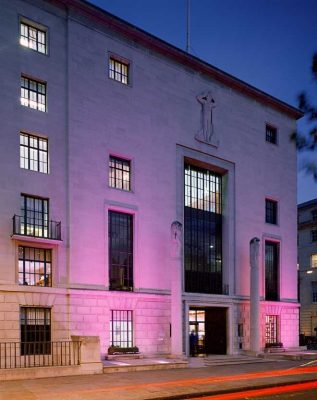
photograph © The RIBA
RIBA Events – Archive for 2015 to 1 Sep 2016
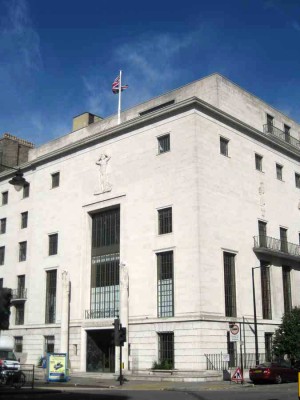
photo © Adrian Welch
RIBA AHR Stephen Williams Scholarship 2016

photo © Morley von Sternberg
RIBA Event London – Archive
Location: London, England, UK
UK Architecture
British Building Designs – architectural selection below:
The Shard London – new photos
Chartered Institute of Building
RIBA President : Angela Brady
RIBA Trust Autumn Lecture Series 2009
London Architecture Events:
Bartlett School of Architecture Event
Comments / photos for the RIBA News, London Architecture Events page welcome

